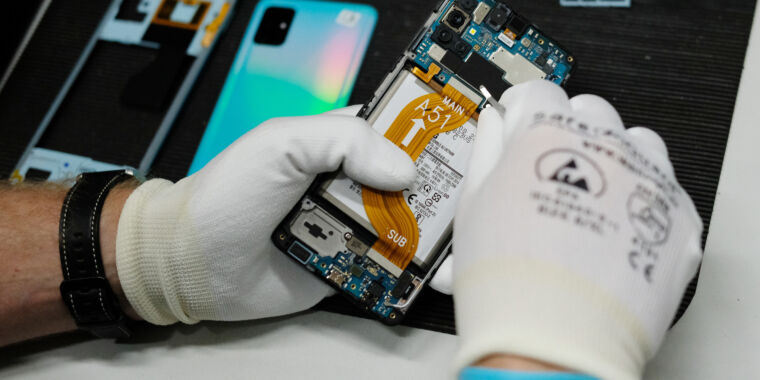
Getty Images | Andrey Denisyuk
T-Mobile won the lion’s share of spectrum licenses in the latest Federal Communications Commission auction, helping it fill rural network gaps that evoked comparisons to Swiss cheese. T-Mobile’s winning bids totaled $304.3 million, letting it obtain 7,156 licenses out of 7,872 that were sold, the FCC announced yesterday.
T-Mobile’s licenses are spread across 2,724 counties (out of 3,143 total in the US). The second-highest bidder in dollar terms was PTI Pacifica, which spent $17.7 million on nine licenses in five counties. “With most of the available spectrum in the 2.5 GHz band located in rural areas, this auction provides vital spectrum resources to support wireless services in rural communities,” the FCC said.
The auction provided up to three blocks of spectrum, totaling 117.5MHz in each county. In terms of the number of licenses won, the second-place finisher was the North American Catholic Educational Programming Fund. Its winning bids totaled $7.8 million and cover 107 licenses in 84 counties.
There were 63 winning bidders overall, and the auction raised $427.8 million. Small entities and rural service providers were given discounts on the license costs. The 2.5 GHz spectrum was originally set aside for educational institutions but has been repurposed for commercial service.
T-Mobile network already big on 2.5 GHz
Mid-band spectrum such as 2.5 GHz has been good for boosting capacity and speeds over relatively large areas. While low-band spectrum is best at covering long distances and penetrating obstacles, there’s more spectrum available in the middle and upper bands. At the highest extreme, millimeter-wave spectrum provides the fastest speeds but has the smallest coverage areas.
T-Mobile already makes heavy use of 2.5 GHz spectrum in its 5G network. AT&T and Verizon use mid-band spectrum in the 3.7 GHz to 3.98 GHz range, which they’ve deployed more slowly than planned because airlines haven’t yet retrofitted or replaced all of the older airplane altimeters that can’t filter out transmissions from outside their allotted frequencies.
The new 2.5 GHz licenses are “flexible‐use geographic overlay licenses,” which means there are restrictions on use to protect carriers already operating in the spectrum. “With overlay licenses, licensees obtain the rights to geographic area licenses ‘overlaid’ on top of the existing incumbent licenses. As with an ordinary flexible-use license, the overlay licensee may operate anywhere within its geographic area, subject to protecting the licensed areas of incumbent licensees,” the FCC explains.
But that won’t present a problem for T-Mobile. As FierceWireless wrote in March after the FCC set the auction rules, the auction is “for ‘white spaces’ of the 2.5 GHz band where no one owns the spectrum. T-Mobile is particularly interested in Auction 108 because it already owns or leases much of the 2.5 GHz spectrum across the United States, and it wants to fill in the gaps in its coverage.”
T-Mobile to fix “Swiss cheese” network problem
2.5 GHz licenses were first distributed to educational institutions in the 1980s in “35-mile-radius circles” that “left oddly shaped white spaces where no one owns the spectrum,” FierceWireless explained. T-Mobile already had leases with schools around the country to use the licenses.
“T-Mobile is likely to be the major winner, as the auction will allow the company to fix the ‘Swiss cheese’ problem its 2.5 GHz network grid is known to suffer from,” New Street Research policy analyst Blair Levin wrote at the time.
Before the auction, AT&T and Verizon requested more information on the lease agreements to help them decide whether to bid. The FCC denied the request, saying that “adoption of proponents’ expanded disclosure requirement is beyond the bounds of the existing spectrum leasing rules and the Commission’s prior determinations supporting those disclosure requirements.”
AT&T didn’t buy any licenses in the auction. Verizon, listed under its “Cellco Partnership” name in the auction results, won 12 licenses in nine counties for $1.5 million.








